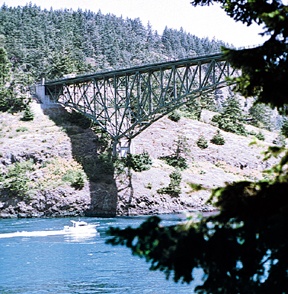Police agencies and volunteers are keeping a close eye on Deception Pass Bridge this weekend in the wake of a terrorist warning issued Thursday by the governor of California.
Gov. Gray Davis said several bridges on the West Coast were possible terrorist targets. By Friday morning, the governor’s warning prompted the phones to start ringing in the Island County Sheriff’s Office.
Deception Pass Bridge is one of the best known bridges in Washington, and last month there were reports that men of Middle Eastern descent had been seen videotaping the structure. Sheriff Mike Hawley called a news conference on Oct. 18 to respond to those rumors.
Hawley said at the time that the men proved to be legitimate roofing employees brought to the island by a contractor. The FBI detained the men at gunpoint in their motel room until background checks cleared them of suspicion. “They were actually tourists,” Hawley said Friday.
Hawley also said Friday there is no new reason to be concerned about the safety of people crossing the bridge. But public fear promoted by the California governor left law enforcement officials here with no choice but to act. Phone calls about suspicious persons keep coming in. “It’s continual,” Hawley said.
Hawley said the State Patrol has assigned a trooper to the bridge and Island County and Skagit County sheriff’s deputies will also watch it, as will volunteers with Citizens on Patrol and other organizations.
The State Patrol issued an advisory Friday saying it “has not received any credible threats to the bridges in Washington State, but continues to be on the highest state of alert.” State Patrol Chief Ronal Serpas urged the public to be vigilant and report suspicious activities by calling 911.
Hawley doubted a truck bomb detonated on top of the bridge would destroy the structure. That would require charges to be placed at critical structural points.
But Hawley said the threat itself was sufficient to do some damage. “That’s probably the whole extent of it,” he said. “We’re spending countless tax dollars to respond and it’s hurting the business climate.”



